Introduction
Nutanix provides an external volume plug-in for Kubernetes. Kubernetes is an open source platform for automating deployment, scaling, and operation of application containers across a cluster of hosts. This cluster of hosts can be made up of cloud provider VM instances, Nutanix-hosted VMs, or bare metal servers. Kubernetes is formed with multiple VMs and a master node.
This plug-in runs in a pod and dynamically provisions requested persistent volume that is compatible with the Kubernetes iSCSI volume. Nutanix then provides persistent storage for the provisioned volume.
Storage classes also have provisioners which determine which volume plugin should be used for provisioning Persistent Volumes. Read more about Nutanix with Kubernetes (here)[https://portal.nutanix.com/#/page/docs/details?targetId=Kubernetes-Volume-Plug-In-v10:Kubernetes-Volume-Plug-In-v10].
Prerequesisites
- Nirmata Cluster with Kubernetes 1.10+, minimum 1 node in a cluster ( We are using Kubernetes version 1.10.8 with 6 nodes).
- Nutanix CE version 5.5 and later
- iSCSI OS plugin
••1. Centos: iscsi-initiator-utils
••2. Ubuntu: open-iscsi
••3. All worker nodes must have the same iSCSI initiator in /etc/iscsi/initiatorname.iscsi
Goal and Key Steps for Integration
The goal of integrating Nutanix with Nirmata is to provide an option for dynamically provisioned persistent volumes with the Kubernetes iSCSI volumes.
- Register at Nutanix for CE edition or use try now to deploy Nutanix. •• 1. Using their own instance’s for integration
- Deploy StatefulSet and DaemonSet using YAML files
- Manage storage
- Create a sample application and create a persistent volume claim
Deploy RBAC YAML to Cluster
To deploy the RBAC YAML to a cluster, open the cluster and then select Apply YAML from the Cluster Settings menu.

Drop the RBAC YAML file into the upload box or select the file from the directory.
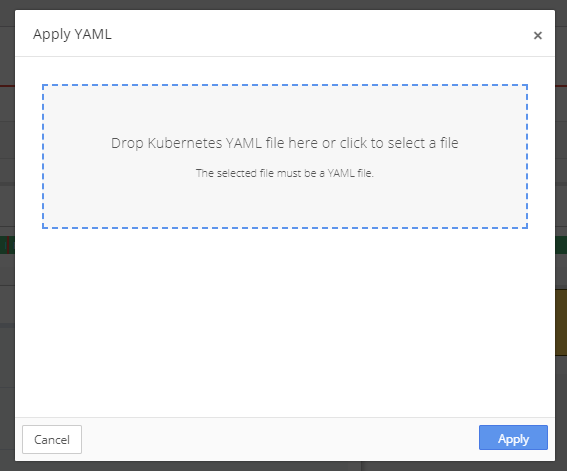
RBAC YAML:
---
apiVersion: v1
kind: ServiceAccount
metadata:
name: csi-attacher
namespace: kube-system
---
kind: ClusterRole
apiVersion: rbac.authorization.k8s.io/v1
metadata:
name: external-attacher-runner
namespace: kube-system
rules:
- apiGroups: [""]
resources: ["secrets"]
verbs: ["get", "list"]
- apiGroups: [""]
resources: ["events"]
verbs: ["get", "list", "watch", "update"]
- apiGroups: [""]
resources: ["persistentvolumes"]
verbs: ["get", "list", "watch", "update"]
- apiGroups: [""]
resources: ["nodes"]
verbs: ["get", "list", "watch"]
- apiGroups: ["storage.k8s.io"]
resources: ["volumeattachments"]
verbs: ["get", "list", "watch", "update"]
---
kind: ClusterRoleBinding
apiVersion: rbac.authorization.k8s.io/v1
metadata:
name: csi-attacher-role
namespace: kube-system
subjects:
- kind: ServiceAccount
name: csi-attacher
namespace: kube-system
roleRef:
kind: ClusterRole
name: external-attacher-runner
apiGroup: rbac.authorization.k8s.io
---
# needed for StatefulSet
kind: Service
apiVersion: v1
metadata:
name: csi-attacher-ntnx-plugin
namespace: kube-system
labels:
app: csi-attacher-ntnx-plugin
spec:
selector:
app: csi-attacher-ntnx-plugin
ports:
- name: dummy
port: 12345
---
apiVersion: v1
kind: ServiceAccount
metadata:
name: csi-provisioner
namespace: kube-system
---
kind: ClusterRole
apiVersion: rbac.authorization.k8s.io/v1
metadata:
name: external-provisioner-runner
namespace: kube-system
rules:
- apiGroups: [""]
resources: ["secrets"]
verbs: ["get", "list"]
- apiGroups: [""]
resources: ["persistentvolumes"]
verbs: ["get", "list", "watch", "create", "delete"]
- apiGroups: [""]
resources: ["persistentvolumeclaims"]
verbs: ["get", "list", "watch", "update"]
- apiGroups: ["storage.k8s.io"]
resources: ["storageclasses"]
verbs: ["get", "list", "watch"]
- apiGroups: [""]
resources: ["events"]
verbs: ["list", "watch", "create", "update", "patch"]
---
kind: ClusterRoleBinding
apiVersion: rbac.authorization.k8s.io/v1
metadata:
name: csi-provisioner-role
namespace: kube-system
subjects:
- kind: ServiceAccount
name: csi-provisioner
namespace: kube-system
roleRef:
kind: ClusterRole
name: external-provisioner-runner
apiGroup: rbac.authorization.k8s.io
---
# needed for StatefulSet
kind: Service
apiVersion: v1
metadata:
name: csi-provisioner-ntnx-plugin
namespace: kube-system
labels:
app: csi-provisioner-ntnx-plugin
spec:
selector:
app: csi-provisioner-ntnx-plugin
ports:
- name: dummy
port: 12345
---
apiVersion: v1
kind: ServiceAccount
metadata:
name: csi-ntnx-plugin
namespace: kube-system
---
kind: ClusterRole
apiVersion: rbac.authorization.k8s.io/v1
metadata:
name: csi-ntnx-plugin
namespace: kube-system
rules:
- apiGroups: [""]
resources: ["secrets"]
verbs: ["get", "list"]
- apiGroups: [""]
resources: ["nodes"]
verbs: ["get", "list", "update"]
- apiGroups: [""]
resources: ["namespaces"]
verbs: ["get", "list"]
- apiGroups: [""]
resources: ["persistentvolumes"]
verbs: ["get", "list", "watch", "update"]
- apiGroups: ["storage.k8s.io"]
resources: ["volumeattachments"]
verbs: ["get", "list", "watch", "update"]
---
kind: ClusterRoleBinding
apiVersion: rbac.authorization.k8s.io/v1
metadata:
name: csi-ntnx-plugin
namespace: kube-system
subjects:
- kind: ServiceAccount
name: csi-ntnx-plugin
namespace: kube-system
roleRef:
kind: ClusterRole
name: csi-ntnx-plugin
apiGroup: rbac.authorization.k8s.io
Deploy the Attacher, Node, and Provisioner YAMLs
To deploy the each YAML to a cluster, open the cluster and then select Apply YAML from the Cluster Settings menu.

Drop the YAML file into the upload box or select the file from the directory.
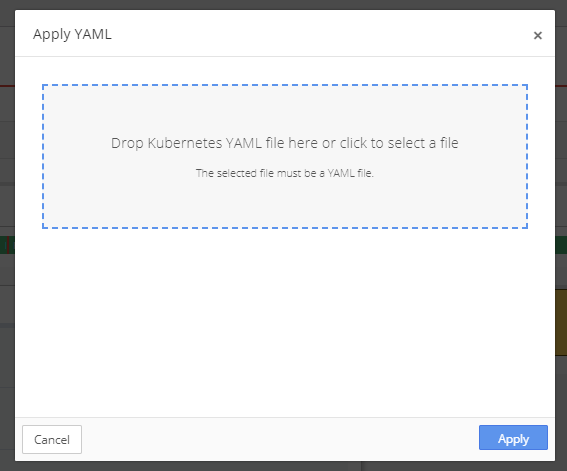
Attacher YAML:
kind: StatefulSet
apiVersion: apps/v1beta1
metadata:
name: csi-attacher-ntnx-plugin
namespace: kube-system
spec:
serviceName: "csi-attacher-ntnx-plugin"
replicas: 1
template:
metadata:
labels:
app: csi-attacher-ntnx-plugin
spec:
serviceAccount: csi-attacher
containers:
- name: csi-attacher
image: quay.io/k8scsi/csi-attacher:v0.2.0
args:
- "--v=5"
- "--csi-address=$(ADDRESS)"
env:
- name: ADDRESS
value: /var/lib/csi/sockets/pluginproxy/csi.sock
imagePullPolicy: "IfNotPresent"
volumeMounts:
- name: socket-dir
mountPath: /var/lib/csi/sockets/pluginproxy/
- name: nutanix-csi-plugin
image: ntnx/ntnx-csi:beta2
args :
- "--nodeid=$(NODE_ID)"
- "--endpoint=$(CSI_ENDPOINT)"
env:
- name: CSI_ENDPOINT
value: unix:///var/lib/csi/sockets/pluginproxy/csi.sock
- name: NODE_ID
valueFrom:
fieldRef:
fieldPath: spec.nodeName
volumeMounts:
- name: socket-dir
mountPath: /var/lib/csi/sockets/pluginproxy/
volumes:
- name: socket-dir
emptyDir: {}
Node YAML:
kind: DaemonSet
apiVersion: apps/v1beta2
metadata:
name: csi-ntnx-plugin
namespace: kube-system
spec:
selector:
matchLabels:
app: csi-ntnx-plugin
template:
metadata:
labels:
app: csi-ntnx-plugin
spec:
serviceAccount: csi-ntnx-plugin
hostNetwork: true
containers:
- name: driver-registrar
image: quay.io/k8scsi/driver-registrar:v0.2.0
args:
- "--v=5"
- "--csi-address=$(ADDRESS)"
env:
- name: ADDRESS
value: /csi/csi.sock
- name: KUBE_NODE_NAME
valueFrom:
fieldRef:
fieldPath: spec.nodeName
volumeMounts:
- name: plugin-dir
mountPath: /csi/
# TODO: the registrar is not implemented yet
# - name: registrar-socket-dir
# mountPath: /var/lib/csi/sockets/
- name: csi-ntnx-plugin
securityContext:
privileged: true
allowPrivilegeEscalation: true
image: ntnx/ntnx-csi:beta2
args :
- "--endpoint=$(CSI_ENDPOINT)"
- "--nodeid=$(NODE_ID)"
env:
- name: CSI_ENDPOINT
value: unix:///csi/csi.sock
- name: NODE_ID
valueFrom:
fieldRef:
fieldPath: spec.nodeName
volumeMounts:
- name: plugin-dir
mountPath: /csi
- name: pods-mount-dir
mountPath: /var/lib/kubelet
# needed so that any mounts setup inside this container are
# propagated back to the host machine.
mountPropagation: "Bidirectional"
- mountPath: /dev
name: device-dir
- mountPath: /etc/iscsi
name: iscsi-dir
- mountPath: /sbin/iscsiadm
name: iscsiadm
- mountPath: /lib/modules
name: lib-dir
volumes:
# TODO: the registar is not implemented yet
#- name: registrar-socket-dir
# hostPath:
# path: /var/lib/kubelet/device-plugins/
# type: DirectoryOrCreate
- name: plugin-dir
hostPath:
path: /var/lib/kubelet/plugins/com.nutanix.csi
type: DirectoryOrCreate
- name: pods-mount-dir
hostPath:
path: /var/lib/kubelet
type: Directory
- name: device-dir
hostPath:
path: /dev
- name: iscsi-dir
hostPath:
path: /etc/iscsi
- name: iscsiadm
hostPath:
path: /sbin/iscsiadm
- name: lib-dir
hostPath:
path: /lib/modules
Provisioner YAML:
kind: StatefulSet
apiVersion: apps/v1beta1
metadata:
name: csi-provisioner-ntnx-plugin
namespace: kube-system
spec:
serviceName: "csi-provisioner-ntnx-plugin"
replicas: 1
template:
metadata:
labels:
app: csi-provisioner-ntnx-plugin
spec:
serviceAccount: csi-provisioner
containers:
- name: csi-provisioner
image: quay.io/k8scsi/csi-provisioner:v0.2.0
args:
- "--provisioner=com.nutanix.csi"
- "--csi-address=$(ADDRESS)"
- "--v=5"
env:
- name: ADDRESS
value: /var/lib/csi/sockets/pluginproxy/csi.sock
imagePullPolicy: "IfNotPresent"
volumeMounts:
- name: socket-dir
mountPath: /var/lib/csi/sockets/pluginproxy/
- name: nutanix-csi-plugin
image: ntnx/ntnx-csi:beta2
securityContext:
privileged: true
allowPrivilegeEscalation: true
args :
- "--endpoint=$(CSI_ENDPOINT)"
- "--nodeid=$(NODE_ID)"
env:
- name: CSI_ENDPOINT
value: unix:///var/lib/csi/sockets/pluginproxy/csi.sock
- name: NODE_ID
valueFrom:
fieldRef:
fieldPath: spec.nodeName
volumeMounts:
- name: socket-dir
mountPath: /var/lib/csi/sockets/pluginproxy/
volumes:
- name: socket-dir
emptyDir: {}
Verify RABC, Attacher, Node, and Provisioner YAMLs are Deployed
To verify that the YAMLs are deployed, run a Kubectl command from the cluster shell.
To run a Kubectl command, open the Cluster Settings menu and select Launch Terminal.
If all YAMLs are deployed, the Kubectl report will be similar to the one shown below.
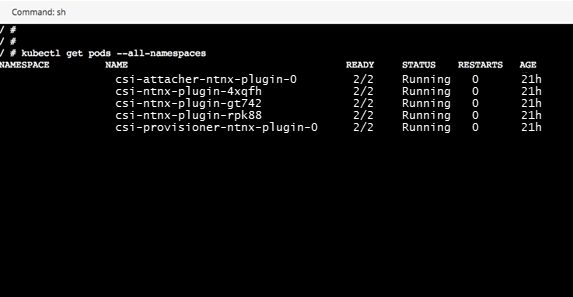
Create a NGINX Application
First, create a secret for the connection to and from Nutanix and the cluster.
To Create a SSH into the Kubernetes Master Node, open a text editor to create the file for the secret. Copy and paste the following code into the file:
apiVersion: v1
kind: Secret
metadata:
name: ntnx-secret
namespace: default
data:
# base64 encoded prism-ip:prism-port:admin:password.
# E.g.: echo -n "10.6.47.155:9440:admin:mypassword" | base64
key: MTAuNS42NS4xNTU6OTQ0MDphZG1pbjpOdXRhbml4LjEyMw==
Make the following replacements in the code:
- Replace prism-ip with the Cluster Virtual IP Address. If a Cluster Virtual IP Address is not configured replace prism-ip with the virtual IP address of any Controller VM in the cluster.
- Replace prism-port with the corresponding port.
- Replace admin_name with the name used for the admin role.
- Replace password with the password for the admin role.
Next, create a Nutanix ACS-ABS storage class.
To create a Nutanix ACS-ABS storage class, open the cluster and select Storage Class from the Resources window.

Then, click the gear in the top right corner and select +Add Storage Class.
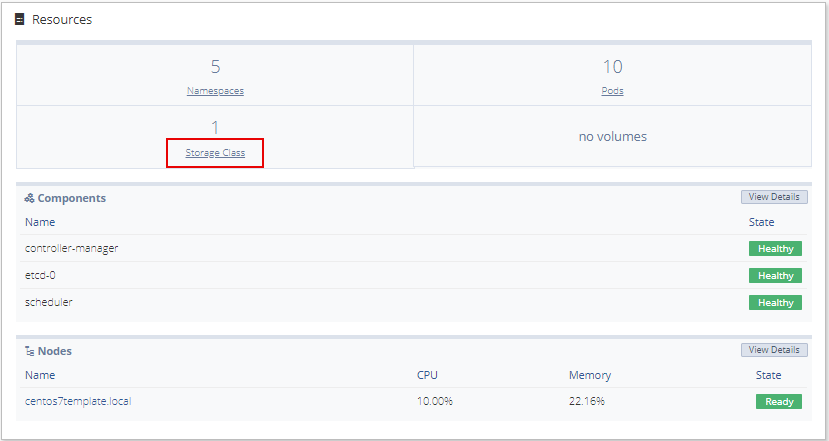
Complete the information in the pop-up window and click Add.
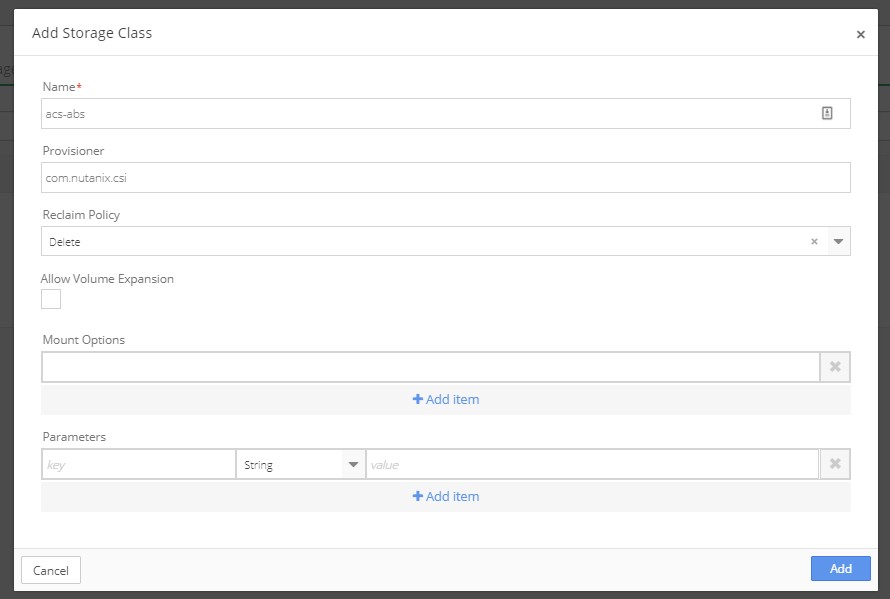
To create and configure the NGINX application, add the NGINX YAML to the Application Catalog.
Select on Catalog in the sidebar menu and then select Application Catalog. From the main Application Catalog screen, click Add Application.
Drop the NGINX YAML file into the upload box or select the file from the directory.
NGINX YAML:
apiVersion: apps/v1
kind: Deployment
metadata:
name: server
spec:
replicas: 1
selector:
role: server
template:
metadata:
labels:
role: server
spec:
containers:
- name: server
image: nginx
volumeMounts:
- mountPath: /var/lib/www/html
name: mypvc
volumes:
- name: mypvc
persistentVolumeClaim:
claimName: claim1
Next, configure the PVC information on the application by selecting the application, and then Config & Storage.
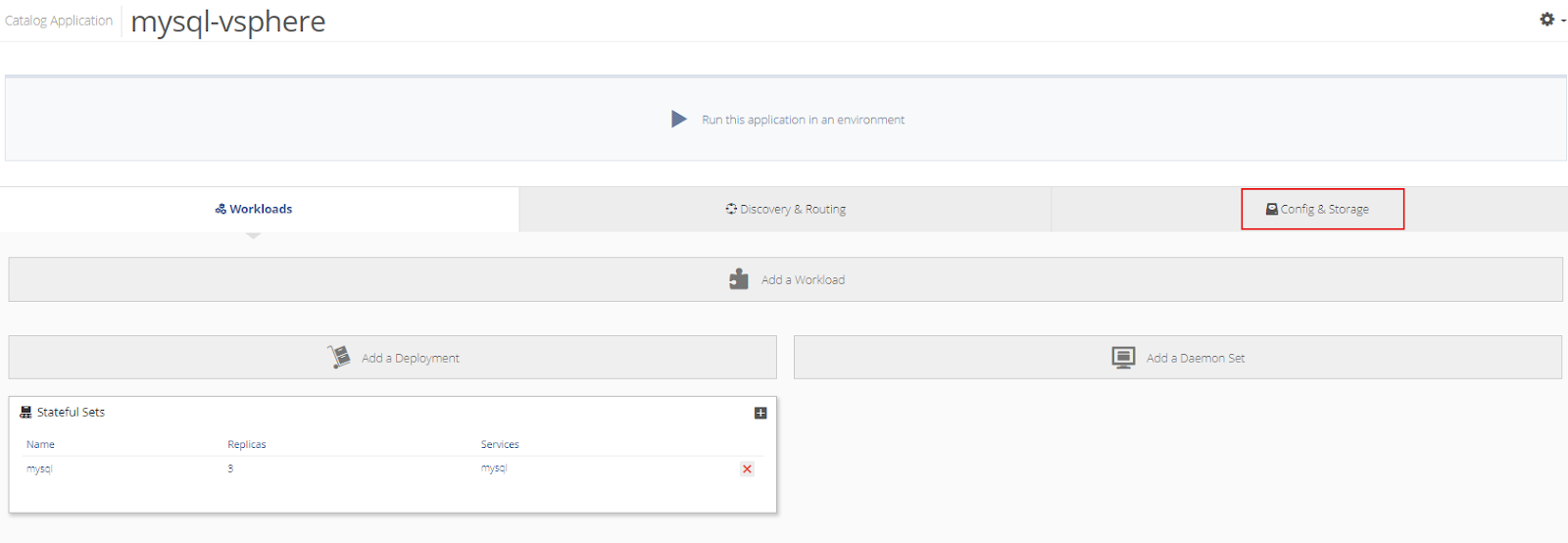
Select the Persistent Volume Claim and make the necessary edits.
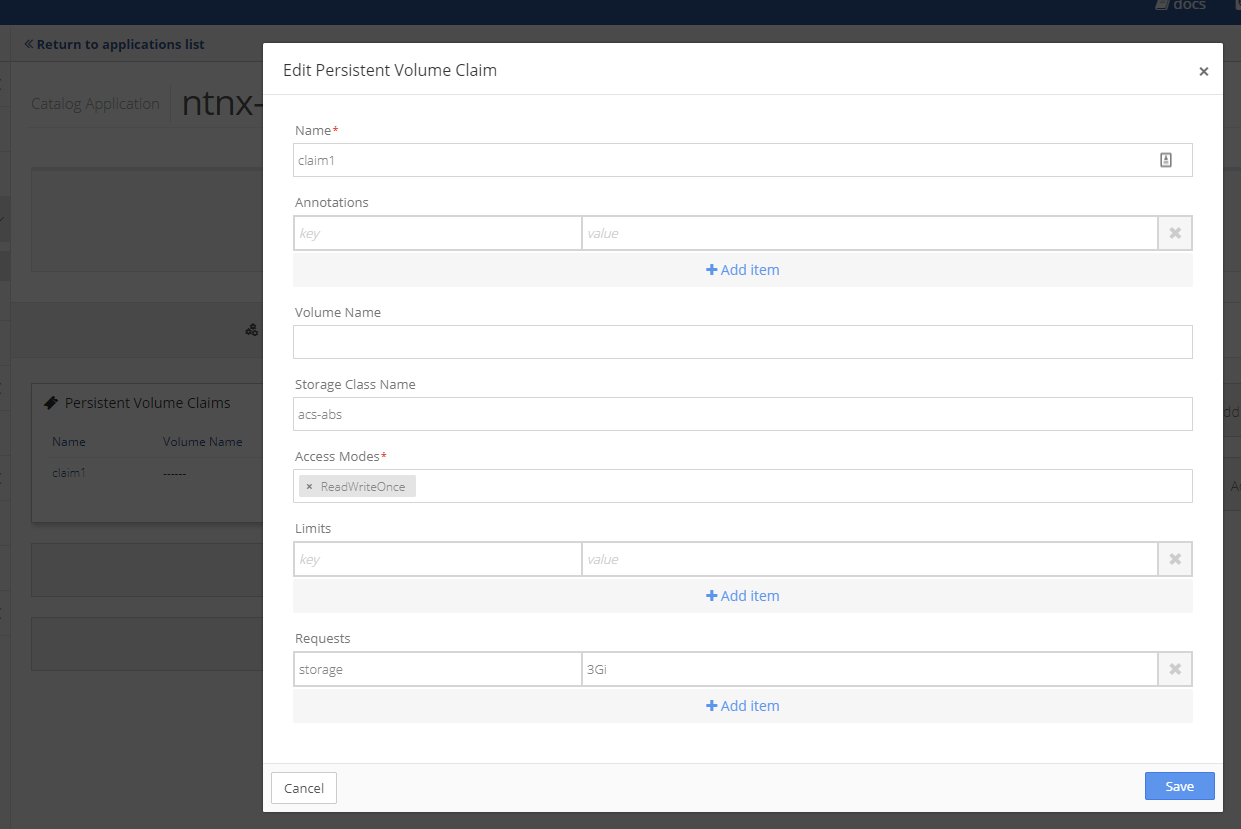
Finally, deploy and view the PVC on the Kubernetes cluster and the Nutanix cluster.